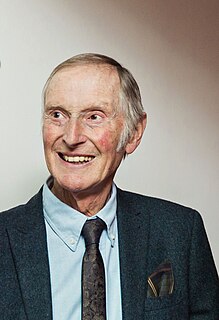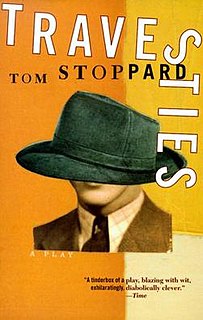The cut-up technique is an aleatory literary technique in which a written text is cut up and rearranged to create a new text. The concept can be traced to at least the Dadaists of the 1920s, but was popularized in the late 1950s and early 1960s by writer William S. Burroughs. It has since been used in a wide variety of contexts.

Dada or Dadaism was an art movement of the European avant-garde in the early 20th century, with early centres in Zürich, Switzerland, at the Cabaret Voltaire. New York Dada began c. 1915, and after 1920 Dada flourished in Paris. Dadaist activities lasted until c. the mid 1920s.

Tristan Tzara was a Romanian and French avant-garde poet, essayist and performance artist. Also active as a journalist, playwright, literary and art critic, composer and film director, he was known best for being one of the founders and central figures of the anti-establishment Dada movement. Under the influence of Adrian Maniu, the adolescent Tzara became interested in Symbolism and co-founded the magazine Simbolul with Ion Vinea and painter Marcel Janco. During World War I, after briefly collaborating on Vinea's Chemarea, he joined Janco in Switzerland. There, Tzara's shows at the Cabaret Voltaire and Zunfthaus zur Waag, as well as his poetry and art manifestos, became a main feature of early Dadaism. His work represented Dada's nihilistic side, in contrast with the more moderate approach favored by Hugo Ball.
"The British Poetry Revival" is the general name given to a loose poetry movement in Britain that took place in the 1960s and 1970s. The revival was a modernist-inspired reaction to the Movement's more conservative approach to British poetry. The poets included an older generation - Bob Cobbing, Paula Claire, Tom Raworth, Eric Mottram, Jeff Nuttall, Andrew Crozier, Lee Harwood, Allen Fisher, Iain Sinclair—and a younger generation: Paul Buck, Bill Griffiths, John Hall, John James, Gilbert Adair, Lawrence Upton, Peter Finch, Ulli Freer, Ken Edwards, Robert Gavin Hampson, Gavin Selerie, Frances Presley, Elaine Randell, Robert Sheppard, Adrian Clarke, Clive Fencott, Maggie O'Sullivan, Cris Cheek, Tony Lopez and Denise Riley.

Lee Harwood was a poet associated with the British Poetry Revival.

Travesties is a 1974 play by Tom Stoppard. The play centres on the figure of Henry Carr, an elderly man who reminisces about Zürich in 1917 during the First World War, and his interactions with James Joyce when he was writing Ulysses, Tristan Tzara during the rise of Dada, and Lenin leading up to the Russian Revolution, all of whom were living in Zürich at that time.
The New British Poetry 1968-88 was a poetry anthology from 1988, jointly edited by Gillian Allnutt, Fred D'Aguiar, Ken Edwards and Eric Mottram, respectively concerned with feminist, Black British, younger experimental and British poetry revival poets. The book's general editor was John Muckle, founder of the Paladin Poetry Series. He attempted to challenge what many saw as a narrowly defined 'mainstream' by creating a book around different strands in radical poetry and four editors who might not otherwise have worked together: "Their differences, both in the shape they have given their selections and in their introductory remarks, make this a many-sided, exciting, unpredictable - and no doubt contentious book." The anthology's multicultural and counter-cultural stance gave it a strong anti-Thatcherite flavour. The book was widely if critically reviewed and went on to influence a number of subsequent anthologies of British poetry.
Children of Albion: Poetry of the Underground in Britain, an anthology of poetry, was edited by Michael Horovitz and published by Penguin Books in 1969. According to Martin Booth it was "virtually a manifesto of New Departures doctrine and dogma".
Penguin Modern Poets was a series of 27 poetry books published by Penguin Books in the 1960s and 1970s, each containing work by three contemporary poets. The series was begun in 1962 and published an average of two volumes per year throughout the 1960s. Each volume was stated to be "an attempt to introduce contemporary poetry to the general reader". The series added up to a substantial survey of English-language poetry of the time.
British Poetry since 1945 is a poetry anthology edited by Edward Lucie-Smith, first published in 1970 by Penguin Books. The anthology is a careful attempt to take account of the whole span of post-war British poetry including poets from The Group, a London-centred workshop for whom Lucie-Smith himself had once been chairman.
The Eric Gregory Award is a literary award given annually by the Society of Authors for a collection by British poets under the age of 30. The award was founded in 1960 by Dr. Eric Gregory to support and encourage young poets. In 2021, the seven winners were: Michael Askew; Dominic Hand; Cynthia Miller; Gboyega Odubanjo; Kandance Siobhan Walker; Phoebe Walker; and Milena Williamson.
The Cholmondeley Awards are annual awards for poetry given by the Society of Authors in the United Kingdom. Awards honour distinguished poets, from a fund endowed by the Dowager Marchioness of Cholmondeley in 1966. Since 1991 the award has been made to four poets each year, to the total value of £8000.
The aims of the Football Australia Hall of Fame are to celebrate and highlight the achievements of retired players and other participants who have contributed significantly to the game. These are made up of either Australian and/or non-Australian players, managers and other participants who have become significant figures in the history of the game in Australia. It was first established as the Soccer Hall of Fame in 1999. New members are generally added each year.
Nationality words link to articles with information on the nation's poetry or literature.
Nationality words link to articles with information on the nation's poetry or literature.
Nationality words link to articles with information on the nation's poetry or literature.
Michael Yechiel Ha-Levi Horovitz was a German-born British poet, editor, visual artist and translator who was a leading part of the Beat Poetry scene in the UK. In 1959, while still a student, he founded the "trail-blazing" literary periodical New Departures, publishing experimental poetry, including the work of William S. Burroughs, Allen Ginsberg and many other American and British beat poets. Horovitz read his own work at the 1965 landmark International Poetry Incarnation, at the Royal Albert Hall in London, deemed to have spawned the British underground scene, when an audience of more than 6,000 came to hear readings by the likes of Ginsberg, Burroughs, Gregory Corso and Lawrence Ferlinghetti.
The International Poetry Incarnation was an event at the Royal Albert Hall in London on 11 June 1965.



